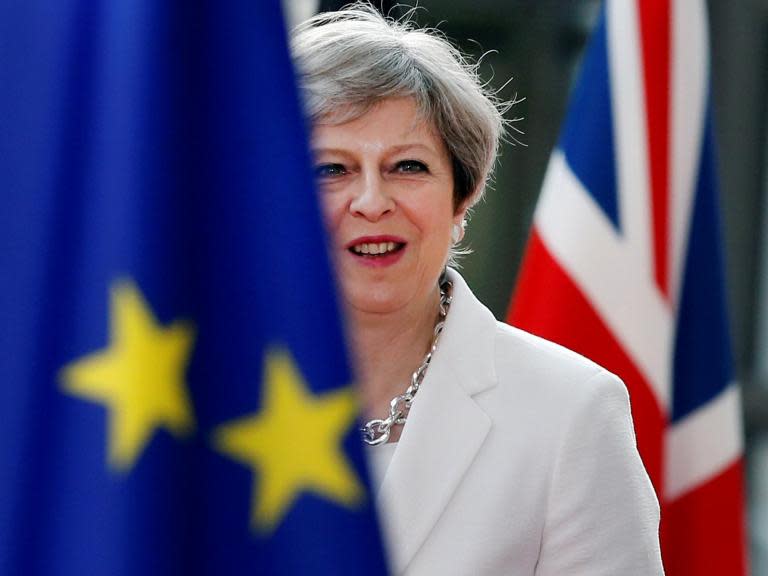Theresa May has backed the wrong side in the Tories’ civil war on Europe
“We’re the PM’s friends now, not mutineers and traitors any more,” one prominent pro-European Conservative told me with a smile last week. It seemed that Theresa May had finally come off the fence by forcing a Brexit plan through the cabinet which was more to the liking of her party’s pro-EU wing than its hardline Brexiteers.
It didn’t last. May has not only jumped back on to the fence but gone over to the other side. This week she sided with the Eurosceptics, even though they were trying to wreck the deal the cabinet agreed at Chequers. Her new pro-European friends were so angry they became the enemy again, and revived their call for a customs union they shelved after Chequers.
May allies argue that she had to tack to ensure her survival. True, her resilience and powers of escapology when cornered are remarkable. A prime minister dealt a very bad hand in Brexit got lucky last night, when five Leave-supporting Labour MPs allowed her to defeat the plan for a customs union by just six votes.
It is also true that May’s blueprint upset a lot of Tory MPs. But not as many as the hardcore Brexiteers led by Jacob Rees-Mogg made out as they threw their toys out of the pram. May had been warned they would make a lot of noise after Chequers, and they did. Yet, she blinked first and caved in, desperate to head off a vote of confidence in her as Tory leader. It would have been better to stick to her guns and allow such a vote to go ahead. The Eurosceptics would not have won the 159 votes (a majority of Tory MPs) needed to oust May. I suspect they would have got 80, or 100 at most. Crucially, May could not then have been challenged for another 12 months, giving her some space to negotiate a deal with the EU. She would have mobilised the mainstream majority of Tory MPs in neither the Brextremist or pro-EU camps. Some don’t like the Chequers plan on customs but would support its basic approach – sticking close to the EU on the regulation of goods to cushion Brexit’s economic impact. This is the group May needs onside to have any chance of getting a deal approved by the Commons.
It might look after this week’s votes that Rees-Mogg’s European Research Group is in the driving seat. But the parliamentary arithmetic has not changed: there is no majority for a hard Brexit. May’s best hope is to build on the softer version the cabinet endorsed, and to appeal to Labour centrists to back it – even though Jeremy Corbyn will order his MPs to vote against whatever deal she secures.
That’s why Tory MPs such as Sir Nicholas Soames and Anna Soubry have raised the prospect of a “government of national unity” to push through a soft Brexit. It’s a bit of a stretch to imagine Corbyn sitting round the cabinet table as deputy prime minister to May. It won’t happen. But there’s an outside chance that, when the crunch comes, some Labour centrists will vote for May’s deal. That’s the only coalition likely to approve it, and the one May must build.
For now, the Commons numbers look grim for May, with every option likely to be voted down. Rees-Mogg’s wrecking amendments to the Customs Bill were designed to make the EU more inclined to reject May’s proposals. The EU believes her customs plan is deeply flawed but does not want to kill off her blueprint because that would play into the Eurosceptics’ hands and make a “no deal” exit more likely. So there will be a glimmer of hope for May when EU ministers discuss Brexit on Friday. The EU will focus on the thorny Northern Ireland border question in the hope of securing a withdrawal agreement, and kicking issues like customs and regulation into the long grass of the trade talks (which cannot start formally until after the UK departs next March). But that would not solve May’s problems; MPs will surely not approve a £40bn divorce settlement without knowing what the future relationship with the EU will be.
Although most hardline Brexiteers claim they want a deal (a limited free trade one), the real goal of many is to run down the clock to next March, when the two-year Article 50 exit process ends, in the hope of a “no deal” exit by default. But the silver lining of recent Commons debates is that a majority of MPs would intervene to stop such an economically-damaging departure.
May’s most important battle is not with Brussels but with the Eurosceptic ideologues in her own party. Events persuaded her to back the wrong side in the Tories’ endless civil war this week. After putting a toe in the water with her Chequers plan, she retreated, again postponing the necessary confrontation with the hardliners in the hope that something turns up by the autumn. That is hardly a strategy when the clock is ticking.

 Yahoo News
Yahoo News 

